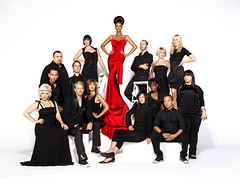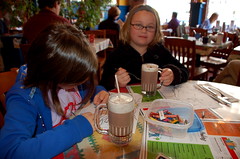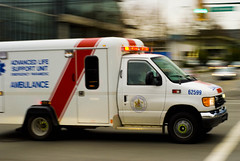Penmachine
30 August 2009
Old man, look at my life
 I've come to realize something in the last few days. My cancer treatment drags on, keeping me alive but not really getting me better. I continue to manage my diabetes and live with an artificial IV port in my chest. I take lots of pills and shots, get medical tests, and see doctors all the time. I can't safely travel very far.
I've come to realize something in the last few days. My cancer treatment drags on, keeping me alive but not really getting me better. I continue to manage my diabetes and live with an artificial IV port in my chest. I take lots of pills and shots, get medical tests, and see doctors all the time. I can't safely travel very far.
More to the point, I hurt, and I'm tired. Many parts of my body simply don't work the way they're supposed to. Most of the time, I'm nothing close to genuinely well. I may never return to my great job. I've been like this in some form or another for more than two and a half years.
So here's what I realized. I'm a 40-year-old man whose body has become much older. I'm a youngish guy in an oldish container. There are plenty of people three decades beyond my age—including my own parents—who feel better than I do, and can do more. And the hard part (for all of us) is knowing there's a good chance they'll live longer than me too.
For the vast majority of human history, living to age 40 was an achievement in itself. Even a hundred years ago, Type 1 diabetes like I have was a death sentence too—I would have died in my early 20s, before I had a chance to marry my wonderful wife or have two great children. I'm glad I've had those chances.
If I were (for instance) 75 years old now, it would be easier to accept what cancer has done to me, and to acknowledge that living (for example) another five years would be a pretty good achievement. I'm trying to think more like that—not to be fatalistic, but to be pragmatic, to know that while I'll keep fighting, without radical new treatments or some very good luck, it's probably a losing battle. But that's not a failure.
I'm sitting on the back porch in the sun, drinking a coffee. In a few minutes I'll help my kids make some cake. It's a good life.
Labels: age, cancer, death, diabetes, family, navarik, pain
19 February 2009
A bit of a shock
 Our friend Kim is one of the designers competing on this season's Project Runway Canada, so we've been watching the show since it started a few weeks ago. It was filmed last summer in Ottawa. At the end of this Tuesday's episode, I was shocked to see an announcement that one of the designers, Danio Frangella (who left during the first episode because of health complications) died last week of cancer. He was 34.
Our friend Kim is one of the designers competing on this season's Project Runway Canada, so we've been watching the show since it started a few weeks ago. It was filmed last summer in Ottawa. At the end of this Tuesday's episode, I was shocked to see an announcement that one of the designers, Danio Frangella (who left during the first episode because of health complications) died last week of cancer. He was 34.
He was not in good shape during that first episode, because he'd been undergoing cancer treatment for seven years, and had trouble walking because of his leg ulcers. Learning that he had died gave me a chill, because of course I have cancer too, and have had it for a couple of years now. Indeed, this week it is exactly two years since I began my medical leave from work. Two years!
If you haven't had cancer or known someone with it, you tend to assume that once someone gets it, they either get treated and go into remission (or are cured), or they die pretty swiftly. Those aren't the only alternatives. Many people live with the disease for years, sometimes decades, undergoing treatments and adjusting their lives around their symptoms and side effects. Danio was one of those, and so am I.
Even successful treatments may not be what you expect. Most statistical studies look at cancer treatments as successful if their subjects are still alive after five years—you often see "five-year survival rates" in such studies. I suppose that's fine if you're a researcher, or if you're a cancer patient in your 70s or 80s.
But if you're not yet 40, like me, or like Danio, five years isn't a very long time. I have a decent chance of surviving five years past my diagnosis, but that's not enormously encouraging, not when most people my age are thinking ahead a lot more than five years. I'm already almost half-way to the five-year mark. All the medications I've taken since 2007 haven't done what they really need to do, which is stop or reverse the nine small metastatic tumours still growing (slowly) in my lungs. On the other hand, I've also already lived longer than a lot of people diagnosed with my sort of aggressive colon cancer do.
One of the first things my gastroenterologist Dr. Enns told me back in '07 is that while there are tons of statistics out there on cancer survival rates, no one person is such a number, and the statistics can't predict how one person's disease will progress, or how long they will live. Just yesterday my oncologist Dr. Kim noted that research shows physicians to be notoriously poor at predicting life expectancy for cancer patients—no better than patients do ourselves, and in many cases no better than a wild guess.
As I wrote recently, I have "months certainly, years quite possibly" to live. How many years, I don't know. Nobody knows. Will I see my kids graduate from high school, or reach my 20th wedding anniversary with my wife in 2015? It's possible, but unless a new treatment starts working, or I go into remission because of lifestyle changes or another reason in that time, it may not be likely.
Then again, some people die young in car crashes or for other reasons, never anticipating their last day, or their last minute. If I'd been born 100 years ago, I would probably have died in my early 20s from diabetes, and might never have married or had children, or even seen a website, let alone built one like this. And if I lived in Swaziland (where 38% of adults have AIDS) or Afghanistan (with astronomical rates of infant mortality), even today, I'd be at the end of the average male life expectancy already.
Here, I am lucky to have a wonderful family, and support, and great health care, and I can still choose to live, to enjoy it, to write what you read, and to make my life as long and happy as I can.
Labels: cancer, chemotherapy, death, diabetes, family, television
02 March 2008
Shitbagged
 Beware: graphic blog post ahead.
Beware: graphic blog post ahead.
Chemotherapy isn't something your body gets used to—the side-effect symptoms generally just get worse and worse as you proceed with treatment. While I've had it better than some folks since my current round began in October, this week—and today in particular—has sucked.
I finished my usual chemo dosage on Friday, but my recovery, usually pretty quick, was slower then normal this week. I had my delayed CT scan Friday evening, then went out for dinner, but yesterday, Saturday, I felt hung over all day, with a dull headache and fatigue.
This morning was a disaster. One of the potential side effects of some of the chemo drugs is late-onset diarrhea, something I haven't had in the four months I've been on this treatment. But I got it last night. Because I've had a temporary ileostomy bag since the summer, I don't have the urge to go to the bathroom. The bag glued to the side of my belly simply fills up, and I have to notice and then head to the washroom to empty it. I did that around 1:30 a.m.
But if things go badly, as they did today, the bag leaks. I noticed around 7 a.m. when it filled up again. I was able to leap out of bed, charged with adrenaline, and avoid making a big mess. After cleaning things off I got into the shower and prepared to put on a new bag, but while washing my hair and shaving, I suddenly felt like I was going to pass out.
Normally for me that would be a sign of diabetic low blood glucose, but after spilling test strips across the kitchen counter, I checked my levels and they were normal. Something else was wrong, and I felt cold fear. I stumbled into the bedroom, still dripping from the shower, and woke my wife as I lay down to keep from falling over. Getting horizontal, I immediately felt a bit better.
After assessing the situation and talking to doctors at the Cancer Agency, she discovered that fluid loss probably made me dehydrated and light-headed. Electrolyte imbalances likely gave me the hangover-like symptoms too. I've been drinking fluids and taking Imodium, as well as sleeping, all day since. I feel mostly normal now, but the headache is still there. My wife is having a nap too, because she was out late last night and didn't get enough sleep before I zombie-crashed her awake first thing today.
I hate having to put her and the kids through crap like this. It scares me too. I hope tomorrow is better.
Labels: cancer, chemotherapy, diabetes, family, fatigue, ileostomy, love
16 February 2008
Do not buy Diet Cherry Chocolate Dr. Pepper
I've really liked Dr. Pepper pop since I was a little kid. After I developed Type 1 diabetes in 1991, Diet Dr. Pepper and some of its variants have been favourites of mine too. But the new Diet Cherry Chocolate Dr. Pepper is simply vile.
Chocolate is a good idea most of the time, even with cherries. But combined with Dr. Pepper? Nope. I bought some a couple of weeks ago, and my family has only now managed to drink the last of it. My wife says it tastes like "bad medicine." My kids think it's tolerable only when it's very cold—and normally they'd fall in love with anything even remotely resembling a carbonated beverage. It is even more repulsive than most other sodas when warm.
What I want to know is why plain old and delicious Diet Cherry Coke remains unavailable in Canada. Forget the weird flavour combinations: if I can get that stuff without having to make a run across the U.S. border, I'll be happy.
Labels: americas, diabetes, food
25 January 2008
Needle boy
I haven't written all that much about my cancer treatment recently, but that's not because things are winding down. Rather, it's simply grinding along as it has since mid-October. Every second Wednesday I go to the B.C. Cancer Agency, take some blood tests, maybe see my oncologist, and then sit in a chair for a few hours while various chemotherapy poisons are fed into my bloodstream. At the end, I'm hooked up through the same IV to a "baby bottle" of 5-FU chemo, which I take home and keep on for 48 hours.
Two days ago was one of those Wednesdays. In a way I'm lucky to have been an insulin-dependent diabetic since 1991. Needles don't bother me. That was good on Wednesday, because in the morning I took two different insulin shots, then had blood drawn for tests, then took some more insulin with brunch, then got plugged into the chemo drip, then had an atropine injection to avoid some side effects, then took more insulin at dinnertime, then took two more insulin shots at bedtime, then finished off with my daily blood thinner needle.
So what's that? Ten needles in one day, some to take fluids out of my body, others to put them in. Whew. And I'm not even counting the finger pricks I do at least four times daily to test my blood glucose. Lots of people don't get that many needles in a year. Today I get the bottle taken off, which is always a relief. (I can't get my chest wet while the chemo is on because of the needle taped to my body, so my Friday post-unhook showers feel amazing.) This will continue until at least late March.
If you met me on the street, other than my increasingly-scraggly hair, you'd be hard-pressed to know I was a cancer patient until I told you. Or unless I let you examine my fingers and inner elbows and chest for all the needle and lancet scars. So it's pretty hard for me to forget what's going on.
Labels: cancer, chemotherapy, diabetes, pain
21 October 2007
Immunity and treatment, and coffins for children
It will soon be flu vaccine season again. Most parents in Canada have their kids vaccinated not only against flu, but also against a variety of other diseases. That's what governments and school boards and medical bodies recommend, and I agree with them—my wife and I have our kids immunized. As someone with diabetes and now cancer, I also get a flu shot every year, and have received vaccines against viral pneumonia and other pathogens.
I've written before about that, and about how links between MMR vaccines and autism don't seem supported by the evidence. There are other worries, but I think the common panel of immunizations has more benefits than risks. Measles, mumps, rubella, polio, and other diseases are nasty. Some of them often crippled and killed people.
Dr. Tara Smith has a good blog post on vaccines and other treatments not only for historically prevalent viral diseases, but also newer ones like AIDS. "People simply don't remember the havoc vaccine-preventable diseases used to wreak," she writes, "[which is] an attitude that leads to apathy. [T]he best public health is invisible—preventing disease rather than responding to outbreaks, so it's difficult for the average individual to realize how important it is until it's broken."
She's talking about AIDS (even though it has no vaccine yet), which here in the West has gone from death sentence to controllable condition in only a quarter century. In much of the rest of the world, it is still an unimaginable scourge, even while child mortality from other causes declines. First here in the industrialized world, and how slowly elsewhere, hygiene, better diets, and modern medicine have ameliorated conditions that routinely killed children and adults for almost the entire multi-million year history of our species.
One of the biggest changes in the past century is that parents can now reasonably expect to see all their children reach adulthood. Let me repeat: that wasn't true before. Routine childhood deaths were something Florence Nightingale, Charles Dickens, King Kamehameha, Isaac Newton, Queen Elizabeth I, Charlemagne, Genghis Khan, Acamapichtli of the Aztecs, William the Conqueror, Cleopatra, Julus Caesar, the Buddha, the Kings of Nubia, and Lucy the australopithecus shared with one another—and we do not. Here's an example.
In the early days of photography, people had to hold still for minutes at a time for portraits, like mannequins. (No wonder there were so few smiles. Or maybe that was the dental care.) Anyway, young children, as today, didn't tend to sit still, so those kids who did appear in family photos were frequently dead ones. It was the only way to get photos of them. And there was no shortage. They died, for the most part, from bacterial diseases treated today with antibiotics, viral infections now prevented by vaccines, and infections now controlled by better hygiene, nutrition, and general health.
Yes, we may be subjecting our kids to environmental toxins and other mysterious things that cause rising rates of asthma and allergies, and other conditions that are either more common to our more artificial world, or that were previously masked by all the sickness and death we now avoid. Yes, infant cold medicines probably don't work. But let's not forget that children simply are not sickened, maimed, and killed at anything remotely resembling the rates they used to be, in ways our parents and grandparents still remember.
And yes, there are newer vaccines like Gardasil for which the preventative benefits are still being established (heavy advertising by manufacturer Merck does promote caution in my mind). Less drastically, while chickenpox is rarely fatal, being immunized against it can also prevent the appearance of the much nastier condition shingles later in life. It is the same virus, re-emerging from decades of dormancy in the body.
Perhaps we need to improve the way and timing with which we administer treatments to our kids and ourselves, to get more benefit and reduce what risks they are. My wife and I are still going to get our shots this year (unless my oncologist recommends against it for me), and so are my daughters. Be smart and cautious with the treatments you give your own family.
But don't avoid modern medical preventions and treatments altogether. We cannot write off the biggest gift that science has given us over the last hundred years: making it an ever-shrinking, niche industry to build coffins for children.
Labels: cancer, controversy, death, diabetes, family, probability, science
01 October 2007
The Blue Fox pushes me over the line at last
 This morning, for our last major meal in Victoria, my daughters and I let my wife sleep in and met my friend Simon for breakfast at a place he recommended, the Blue Fox Café on Fort Street.
This morning, for our last major meal in Victoria, my daughters and I let my wife sleep in and met my friend Simon for breakfast at a place he recommended, the Blue Fox Café on Fort Street.
I've walked by the Blue Fox a few times before, noting how busy it was, usually with a lineup. Fortunately, since today is Monday, we found no line at 9 a.m., although the place was still busy. I can see why it's popular: tasty and wholesome versions of basic breakfast foods (eggs, French toast, roast potatoes, sausage and bacon, coffee) in large portions, with reasonable prices and friendly service, plus vaguely ethnic Mediterranean-Mexican-Southwest decor (lots of saffron yellows and deep blues) and reggae music on the sound system. We all ate a lot, and my daughters had two hot chocolates each ("Best ever!" said my oldest). Ah, vacation.
Anyway, it seems that meal finally helped me reach a milestone. When I weighed myself at home tonight, I hit 176 pounds, the first time I've been over 175 since before my cancer surgery way back in July, some 30 pounds above what I weighed at my worst in hospital late in that month, and only about 15 pounds below what I probably should weigh, which is about 190. (I hovered around 200 pounds for many years until my cancer diagnosis early in 2007.)
I'm still a bit too thin and bony, but, other than the damned ileostomy bag, I feel more like a normal human being than I have for a long time. And I take considerable pleasure in being able to pig out pretty much as I like, within the confines of my diabetic diet. I hope I can keep that up once the next round of chemotherapy starts in a couple of weeks.
I'll be back to the Blue Fox on our next visit to Victoria, that's for sure. The kids want mom to come with us.
Labels: cancer, diabetes, food, travel, victoria
07 September 2007
I slept all day today
I did too much yesterday: I walked the kids to school and came back, then went (ironically) to a relaxation session at the Cancer Agency, followed by lunch, a bit of shopping, picking up the kids, and home for dinner, then off to the Lab With Leo 100th episode party in the evening.
And then, today, I paid for it. I took the kids to school again, then came home and went to sleep. For two hours. Then I woke and had lunch, and watched a bit of TV to try to wake up, which didn't work. I fell asleep again for another two hours until my wife brought the kids home—along with an awesome sugar-free slush drink for me. I feel a lot better now, but I still need to pace myself. Maybe one or two activities a day is still a good benchmark.
Time to get dressed.
Labels: cancer, diabetes, family, fatigue, food
26 August 2007
Crash
 It turns out that the other antibiotic I'm taking, metronidazole, has fatigue as a side effect—just what I need. Yesterday I woke up, got the kids breakfast, and flaked around for awhile. Then we went to Ikea for a couple of hours. When we got home, I slept for another three hours before dinner. At 7:30 I slept again, all night, until almost 10:00 this morning.
It turns out that the other antibiotic I'm taking, metronidazole, has fatigue as a side effect—just what I need. Yesterday I woke up, got the kids breakfast, and flaked around for awhile. Then we went to Ikea for a couple of hours. When we got home, I slept for another three hours before dinner. At 7:30 I slept again, all night, until almost 10:00 this morning.
I think I could sleep all the time given the opportunity. Most of the time, when I think "what was I doing 12 hours ago?", the answer is "sleeping." It's insane. Fortunately I'm only taking these pills for ten days, then perhaps I'll perk up again.
It would probably be fine if I weren't so tired to start with, but compounding the fatigue I already have is more than I'd prefer to deal with. Maybe a bunch of coffee would help.
Labels: ambulance, antibiotics, cancer, diabetes, fatigue, hospital
24 August 2007
Corners
 Yesterday turned out not so well after all. Turning corners is sometimes tricky. Around 4 in the afternoon I started getting diabetic hypoglycemia—low blood sugar—which does happen from time to time. I've been diabetic for 16 years, and my usual treatment is a simple can of Coke, which usually takes care of it quickly.
Yesterday turned out not so well after all. Turning corners is sometimes tricky. Around 4 in the afternoon I started getting diabetic hypoglycemia—low blood sugar—which does happen from time to time. I've been diabetic for 16 years, and my usual treatment is a simple can of Coke, which usually takes care of it quickly.
Not this time. I was unable to stabilize my blood sugars with Coke, with snacks, with juice, with brown sugar, with pudding, or with anything else. My wife became worried about me, as did I, because unchecked hypoglycemia can make me pass out.
Eventually we called an ambulance, which took me to Burnaby Hospital's Emergency ward, where they stabilized me and gave me some food. A few hours later the doctor discharged me and I went home.
After I had a bath and calmed down some, I read through the customer information for the couple of new antibiotics I started taking, which were the only new things that had happened yesterday.
Sure enough, one of the two drugs "may affect your blood sugar." No kidding. I had specifically asked my prescribing surgeon whether everything was okay for diabetes, and had mentioned it to the ambulance crew, and the nurses, and the doctors at the hospital, but no one knew about that. Just a reminder to be vigilant about your medications—the professionals don't know about every possible interaction.
And I'm fine now, just tired again.
Labels: ambulance, antibiotics, cancer, diabetes, fatigue, hospital
